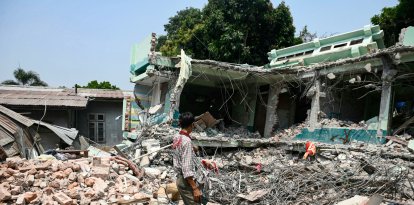Global response one month after the attack on Israel: From solidarity to antisemitism
The brutal increase in hateful actions against Jews has marred tributes and support for the victims of the Hamas terrorists who started the war.

Rally for the release of Hamas hostages in New York on October 19 / Cordon Press
On the morning of Oct. 7, the world woke up horrified by the worst massacre of Jewish civilians since the Holocaust. Since 6:29 a.m. that day, the information arriving from the border with Gaza reported an unprecedented attack by Hamas terrorists due to its scope and cruelty. Much of the world stood in solidarity in the face of horror. However, anti-Israeli movements were quick to accuse the "suffocating Israeli occupation" of causing the tragedy. In the 30 days since, the tributes have been marred by an increase in antisemitic acts, including murders, threats, and insults. The latest case was the death of a 65-year-old Jew in Los Angeles last Monday at the hands of a pro-Palestinian protester.
The Shloshim (30 days)
Coinciding with the 30 days since the massacre occurred, and following the Jewish calendar of mourning, communities in the United States have prepared a wide series of events and demonstrations to commemorate the memory of the victims and those injured and kidnapped. The milestone of 30 days after the death of a loved one is a significant moment for Jews. It marks the Shloshim, a secondary period of ritual mourning, following the Shiva , which lasts for seven days after the burial for those who have lost a spouse, a brother or a child. People who lose a parent mourn for a whole year.
During these 30 days, those who mourn avoid activities such as cutting their hair, listening to music or attending religious celebrations and social events. However, they can resume many personal and professional pursuits that were avoided during the shiva.
Explosion of antisemitism
However, the period of mourning has been marred by many hateful acts against Jews. The latest was the death of an elderly Jewish man in California as a result of the attack by a pro-Palestinian protester. Since the massacre, swastikas and Stars of David have been engraved or painted on the homes of Jewish citizens in Germany and other European countries, and even in North and South America. Pogroms have returned to Russia, like the one suffered by incoming passengers on a plane that had left Israel. Last weekend, a Jewish woman was murdered in her home in Paris with the Nazi symbol etched on her door. Protestors have chanted Hamas slogans and demanded an end to the Israeli offensive against terrorism around the world.
Tlaib and Guterres: Political faces of antisemitism
Despite the evidence of the terrorists' cruelty presented by the Israeli authorities, the Jews have had to endure the allegations of politicians like Democratic Rep. Rashida Tlaib and some of her colleagues in "The Squad" attacking Israel and blaming the massacre on the "suffocating Israeli occupation of Gaza." The legislator of Palestinian origin even participated in a march against Israel that ended up invading the Capitol grounds and called for Jews to be thrown into the sea, as says one of the terrorists' slogans.
The UN and especially Secretary General Antonio Guterres also accused Israel of causing the Hamas attack. His words provoked condemnation from the Israeli authorities. Israeli Ambassador Gilad Erdan demanded Guterres' resignation. Furthermore, only 14 countries sided with the Jewish state in the UN compared to 120 that supported Hamas. As if that were not enough, other organizations such as UNICEF have issued statements only supporting the Palestinian victims of the conflict, ignoring the more than 1,400 Israelis killed in the terrorist attack on Oct. 7.
Antisemitism on college campuses
This antisemitic atmosphere has been perfectly exhibited on U.S. college campuses, where there have been demonstrations, threats and attacks against Jewish students. At Cornell University, the FBI was forced to investigate death threats due to their high degree of credibility. At Cooper Union (New York), Jewish students were forced to take shelter in the library due to the pro-Hamas demonstrations outside and had to be evacuated through tunnels. In addition, students and authorities at universities such as Harvard and Columbia issued statements against Israel.
RECOMMENDATION





















